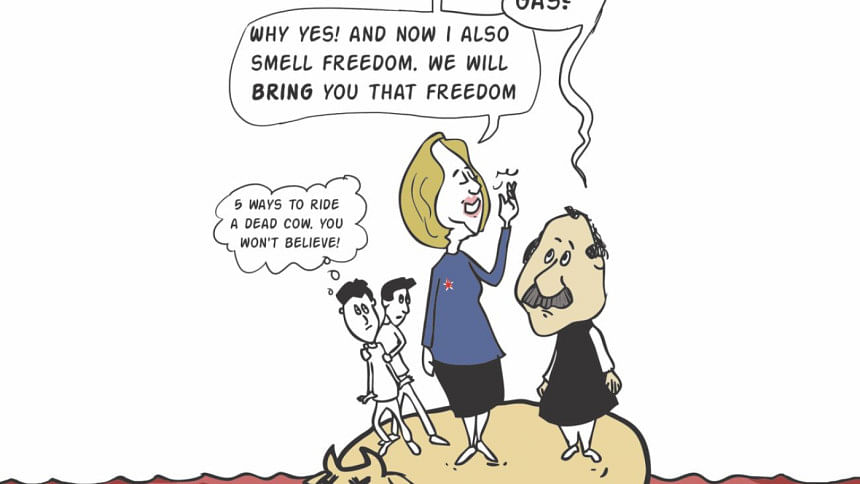The Poor Drainage System of Blood

“Is it easier for you to eat a steak dinner when you don't have to imagine what the insides of your slaughterhouses look like? Is it less barbaric because you don't have to see it, ever? Are you for real, or are you posing?”
—Syed Athar Ali, Electrical Engineer, Columbia University
A Kashmiri Indian, an Israeli settler in Palestine, a Bangladeshi politician/businessman, a click-bait journalist from a click-bait national daily and ANY British-American all gather in front of the banks of the river Shantigar, once a proud, age-old neighbourhood and one of the most densely populated areas of the country. They were all here on a Human Right's mission; the most righteous among us all collectively trying to make sense of what happened here. The remnants of the high-rise buildings which once dotted the Shantinagar landscape jutted out from beneath the flowing red river of blood, reminiscent of a dying man lifting his arm out of the water in one last futile effort.
But this River of Blood, which threw western media into frenzy and distracted them from the issues of electing a liar or a racist to lead the free world and the genocide in Kashmir, wasn't an ever-present fixture as the sunken buildings reminded the observers. This wasn't also a random act of God. This was a man-made disaster, borne out of turning a blind eye to the perversions that men wreaked upon the orders of the divine. The British-American was the first to retch, overcome by the disgust and depravity of what she was seeing before her. She had never seen a more horrendous sight. The famine her grand-mother had fostered leading to the death of around four million people in these very lands where she now stood was a long forgotten memory; let's not talk about the past. Even her husbands recent forays into Afghanistan, Iraq and Syria, where he made quite a name for himself bombing schools was forgotten. The false war that permanently ravaged a nation was also forgotten. But rain water mixed with the blood of slaughtered cattle? Unforgivable and unforgettable. What a savage people.
The Kashmiri Indian instantly moved in to console her. “The barbarity of these people will not go unheard. To prevent this from spreading, we can impose an unending curfew and bully these people into submission while you can ask your friends to a turn a blind-eye as they did back in 1971 and numerous other times. You can see the effectiveness of that in the news, in the small panel box below the imposing news about 5 Most Unbelievably Cute Cats,” he said to her, his voice too filled with melancholy at the thought of the massacre. The click-bait journalist suddenly had his ears pricked. Cutest Cats and Eyes Gouged Out would make a wonderful news piece. It would probably even go viral because virality is all that mattered. He quickly made a note and decided to call his editor. Then he realised he obviously had no editor. Click-bait journalism was that easy. The sun began to set on the river, setting it ablaze. The blood of a 100,000 cattle suddenly seemed to come alive, the water becoming congealed and translucent, the unheard cries forever drowned.
The Bangladeshi Politician, though, stood stumped and deep in contemplation, his arms folded his across his chest and his legs placed wide apart, marking his man-space. The fair- toned privilege around him sickened him but he was unsure what to do next. “This river of blood may have started when the lords of the land struck down a 100,000 cows and the gods saw fit to wash them away with rain whilst we forgot about the drainage thingy and also our effort of distributing 220,000 bags to a city of more than 5 million people may haven't been the most well thought out plan but I promise it was better than previous years,” he exclaimed, his protestations silenced by a murmur of dissent. “The Food and Agriculture Organisation of United Nations conducted a survey in 2005 among all meat eating countries and it was found that Bangladesh ranks the last in terms of meat consumption with the USA at a number three,” the politician shouted, his anger now palpable. “Yeah, well, our animals don't bleed and even if they did, you never saw it you barbarian,” the Israeli Palestinian retorted. “Anyway, this river is mine now. That's the only way to solve this problem. I am going to build a few homes here and everyone knows Shantinagar always belonged to us,” he concluded. “How do you figure?,” the politican asked, now exasperated and bewildered. At this point, the British American came forward and handed the Israeli Palestinian a check of 38 billion dollars. “For your new homes in this disaster of a land. A people persecuted must always be a people protected. Now, we must restore Democracy and Freedom in these bloodied soils. Call the drones and tanks and some gas drills while you are at it” she barked to no one in particular. The Bangladeshi Politician had nothing left to say. He got on his bus, a line of which he owned, and promptly ran over the click-bait journalist and shot a rickshawpuller for good measure.
The rest stood on the banks and watched the swirl of the maddening red, a sick sweet smell permeating the air. A truck marked “Terrorists/Maybe” pulled up and began dumping the bodies, replenishing the River of Blood, a river that now snaked its way across the entire globe. If there was one thing that was readily available in 2016, it was blood. The cow's blood, the goat's blood, my blood and your blood. That and unbelievable bias.

 For all latest news, follow The Daily Star's Google News channel.
For all latest news, follow The Daily Star's Google News channel. 



Comments